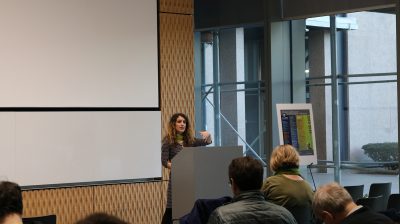Hilary Putnam, a notable philosopher of this century, spent a large portion of his professional life teaching and researching just minutes from Commonwealth Avenue as a professor at Harvard University. There, he taught and developed his theories on the field of analytic philosophy, a style of philosophy that emphasizes logical analysis and the study of language.

and Monday in the Rajen Kilachand Center for Integrated Life Sciences and Engineering. The colloquium marked roughly three years since Putnam’s passing.
Speakers touched on topics central to what and how humans experience every waking moment. The lectures ranged from esoteric to immediately accessible.
Henri Wagner, a professor of philosophy at the University of Bordeaux Montaigne in France, delivered a lecture titled “Putnam and Evans on the Relation between the Principle of Discrimination and the Division of Linguistic Labor.”
One section of his talk explored “Putnam’s view on the incompatibly between externalism and first-personal privileged authority on one’s own meanings and thoughts,” according to a handout Wagner provided to the audience.
During the presentation, Wagner explained the relationship between perceiving and understanding the world.
“In order to be thinking about an object … one must know which object it is that one is thinking about,” Wagner said.
Matthew Cutler, a junior in the College of Arts and Sciences, attended the talk Sunday.
“I’ve really enjoyed the whole experience,” Cutler said. “Certain speakers really challenged my understanding of what consciousness actually means.”
Among those speakers was Zeynep Soysal, an assistant professor of philosophy at University of Rochester. Soysal said Putnam’s work left an impact on her that lasted throughout her career.
“I wrote my undergraduate thesis on Putnam’s model-theoretic arguments,” Soysal said in an interview. “[That’s] precisely the topic of my talk today.”
Soysal said she could not overstate the impact of Putnam on the entire field of philosophy, including the philosophy of language, philosophy of mathematics, philosophy of mind, pragmatism and ethics.
“I think it would be fair to say that one cannot be an analytic philosopher today without at some point having engaged with Putnam’s work,” she said. “He is one of the most creative thinkers, and also incredibly fun and entertaining to read.”
Ned Block, a professor of philosophy, psychology and neuroscience at New York University, delved into the non-conceptual aspects of perception in his presentation. Block said he has a more personal connection to the philosophical icon than most.
“I was undergrad at MIT in 1960,” Block said in an interview. “He came in ‘61, and I took a course with him, … and it really blew my mind. Then I took a course with him every semester. Then he was my Ph.D. advisor, so I really got interested in all this through him.”
Through his work, Block has addressed questions regarding consciousness.
“Are fish conscious? Should we eat them?” he asked. “How could we know if someone we met in outer space was conscious?”
Despite centuries of investigation into consciousness, Block said humans are only “a tiny bit closer” than at any other point in our history.
“Computers don’t seem to help at all with understanding,” he added. “Consciousness is one of the more noticeable features of our own mind. It would be great if we could understand what it is.”



























































































































